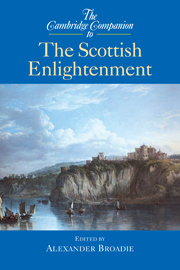Book contents
- Frontmatter
- Introduction
- 1 The contexts of the Scottish Enlightenment
- 2 Religion and rational theology
- 3 The human mind and its powers
- 4 Anthropology: the ‘original’ of human nature
- 5 Science in the Scottish Enlightenment
- 6 Scepticism and common sense
- 7 Moral sense and the foundations of morals
- 8 The political theory of the Scottish Enlightenment
- 9 Economic theory
- 10 Natural jurisprudence and the theory of justice
- 11 Legal theory
- 12 Sociality and socialisation
- 13 Historiography
- 14 Art and aesthetic theory
- 15 The impact on Europe
- 16 The impact on America: Scottish philosophy and the American founding
- 17 The nineteenth-century aftermath
- Select bibliography
- Index
13 - Historiography
Published online by Cambridge University Press: 28 May 2006
- Frontmatter
- Introduction
- 1 The contexts of the Scottish Enlightenment
- 2 Religion and rational theology
- 3 The human mind and its powers
- 4 Anthropology: the ‘original’ of human nature
- 5 Science in the Scottish Enlightenment
- 6 Scepticism and common sense
- 7 Moral sense and the foundations of morals
- 8 The political theory of the Scottish Enlightenment
- 9 Economic theory
- 10 Natural jurisprudence and the theory of justice
- 11 Legal theory
- 12 Sociality and socialisation
- 13 Historiography
- 14 Art and aesthetic theory
- 15 The impact on Europe
- 16 The impact on America: Scottish philosophy and the American founding
- 17 The nineteenth-century aftermath
- Select bibliography
- Index
Summary
The historiography of the Scottish Enlightenment has had an unparalleled influence on the way history has been understood in the United Kingdom, North America and throughout the erstwhile British Empire. It is to the Enlightenment that we owe the ideas of historical progress, of state development through time and, ultimately, the whole teleological apparatus which for many years sustained what was known as the school of Whig history: the analysis of the past not on its own terms, but in the light of what it could contribute to an account of progress towards the present. In the last century historiography has diversified from this model, but the teleological vision still exercises a hold on both the popular imagination and some areas of historical scholarship, particularly in the narrative history still dominant in media programmes and school textbooks. When, for example, some of the new British History traces the past foundations of our country 'for the sake of the present' and its contemporary anxieties over Britishness rather than 'making the past our present and attempting to see life with the eyes of another century', then in Herbert Butterfield's words, we are partaking in 'the subordination of the past to the present', and this vision was central to the Enlightenment. When in The Whig Interpretation of History (1931), Butterfield argued of the past that 'their generation was as valid as our generation, their issues as momentous as our issues and their day as full and vital to them as our day is to us' he was striking not only at posterity's condescension, but at issues which lay at the heart of the complex world of the historiography of David Hume (1711-76) and William Robertson (1721-93) among others.
- Type
- Chapter
- Information
- The Cambridge Companion to the Scottish Enlightenment , pp. 258 - 279Publisher: Cambridge University PressPrint publication year: 2003
- 12
- Cited by



